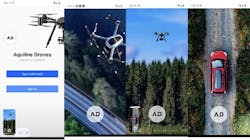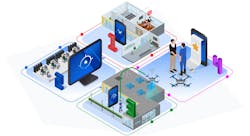U.S. Gets First Drone-on-Demand Mobile App
The Connecticut-based drone services provider, Aquiline Drones Corporation (AD), has launched a beta version of an app that aims to disrupt and revolutionize the way businesses and consumers access and use drone services. The idea is similar to Uber and Lyft, but instead of ordering a ride, users can order drone services.
Here's how it works:
- Users download the app from the Google Play Store or Apple iOS
- They are prompted to set up a user profile
- A list is displayed showing all available drone services for both consumer and business
- Users can then order a specific drone service for personal or commercial use
- The request is then vetted for legality and practicality and matched with a certified and trained drone service provider (DSP). The majority of providers are graduates of Aquiline’s Flight-to-the-Future drone pilot training academy. These DSPs live in the vicinity of the customer’s location and are able to perform the service. With this beta launch, customers can get their requests completed within 30 days. Over time, the period from job request to execution will be significantly shortened to become truly ‘on-demand.’
According to Barry Alexander, Aquiline's CEO and Co-Founder, the app was originally supposed to be used for drone delivery services of light packages, medicines, and prescriptions—eventually being able to scale and acquire mass adoption. However, with the events of the past couple of years, the drone industry suffered delays, layoffs, and supply chain issues—just as most other sectors did—requiring Alexander and Aquiline Drones to pivot their on-demand business model.
Additionally, the FAA (Federal Aviation Administration) still hasn't approved drone delivery like this as it hasn't created the additional and necessary flyways and channels required.
“As we have seen from the recent closing of both the Verizon Skyward and Amazon Prime Air drone delivery business lines, no one can predict how long this approval process will take,” notes Alexander.
But the pandemic isn't the only problem as rising cybersecurity threats and the privacy of drones have been scrutinized by the public. However, Alexander says that commercial drones that are supported by an AI platform are capable of performing a wide array of activities in safer, more efficient, and more cost-effective ways.
In fact, Aquiline has already built a platform for such applications.
Alexander says the app takes a “crawl-walk-run" approach, and readily offers many different semi-autonomous operations that don’t involve surveillance or raise privacy concerns.
For example, some of the available services include:
- Utility inspections such as power lines, pipelines, and wind turbines
- Heavy assets inspections such as bridges, tunnels, construction sites, and railroad tracks
- Consumer services including rooftop inspections, aerial photography, and videography
- Agriculture services including seeding, spraying & hydrating crops, and other farming activities
- Spray washing buildings, solar panels, homes, roofs, and gutters
- Fumigation of bugs and pests around homes and buildings
- Tracking wildlife, beach patrol, and other natural environments
- Sanitation of stadiums, concert halls, and other outdoor/public facilities
- Aerial photography and videography for weddings, real estate, and marketing purposes
Alexander notes that one of the main functions of the app is to aggregate job requests, which then stimulates the drone employment market where people can get into drone services as a career—just like Uber or Lyft.
“Essentially, we are creating both a demand for emerging drone services, as well as a supply of drone operators to fulfill them, thus fostering a powerful workforce development cycle,” adds Alexander.
In fact, Aquiline’s Flight to the Future program (F2F) was launched during the pandemic as an employment opportunity for those interested in becoming certified drone pilots and individual business owners. Within six months, students of the online program learn how to use drone and cloud technology safely and effectively.
Alexander notes that the current pool of approximately 1,500 students can make an easy transition to become DSPs for tasks ordered by customers of the app.
AD supplies three of its own, advanced drone models: the Spartacus Hercules, Spartacus MAX, and Spartacus Hurricane for operators and business owners looking to build up their inventory of equipment and assets.
“The ADoD app is really the entry point into our company’s entire ecosystem of drone products, offerings, and services,” adds Alexander.
“We envision a world in which the full value of commercial drone applications can be ushered into society to help save lives, increase efficiencies, reduce costs, and drive sustainability. We believe in accomplishing these ends in a manner that is ethical and responsible. AD is excited to help make that vision a reality across our nation.”
Future versions of the app will be released in line with the overall UAV industry especially as autonomous drone use develops. Plans include voice-activated commands, live interfaces between the user and the drone during flight, and AI-assisted object recognition.
The app, named Aquiline Drone-on-Demand (ADoD), is available for download on all mobile devices, including smartphones and tablets through the Google Play Store and Apple iOS.


